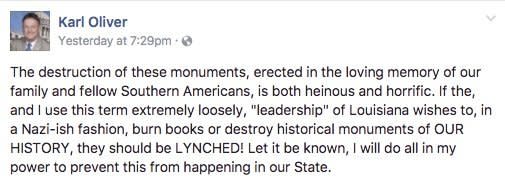GOP Lawmaker: Lynch Anyone Who Takes Down Confederate Monuments
After condemnation from members of his own party, a Republican member of the Mississippi House of Representatives apologized Monday for calling for the lynching of anyone who removes a Confederate monument, including lawmakers in a neighboring state.
On Saturday, state Rep. Karl Oliver (R) had described the “destruction” of Confederate monuments in Louisiana as “heinous and horrific” and compared leaders in that state to Nazis.
“They should be LYNCHED!” Oliver wrote in comments posted on his Facebook page.

The message drew “likes” from two of Oliver’s fellow Republican lawmakers, state Rep. John Read and state Rep. Doug McLeod, the Jackson Free Press reported.
Oliver’s post came a day after a statue of Confederate Gen. Robert E. Lee was removed in New Orleans. It was the city’s fourth Confederate memorial to be dismantled in recent days.
On Monday, following press scrutiny and criticism from members of his own party, Oliver removed the post and issued a statement apologizing for his remarks:
I, first and foremost, wish to extend this apology for any embarrassment I have caused to both my colleagues and fellow Mississippians. In an effort to express my passion for preserving all historical monuments, I acknowledge the word “lynched” was wrong. I am very sorry. It is in no way, ever, an appropriate term. I deeply regret that I chose this word, and I do not condone the actions I referenced, nor do I believe them in my heart. I freely admit my choice of words was horribly wrong, and I humbly ask your forgiveness.
The state’s Republican leaders, including Gov. Phil Bryant, condemned Oliver’s remarks, and the state GOP distanced itself from them, according to Mississippi Today.
“Rep. Oliver’s comments were offensive, do not represent the Mississippi Republican Party and have no place in our public discourse,” Mississippi Republican Party Chairman Joe Nosef said in a statement. “I hope he will quickly clear up his remarks to make his point without these inappropriate comments.”
Democrats in the state blasted Oliver’s call for the violent killing of people he disagrees with.
“I am offended and outraged that a public official in 2017 would, with an obvious conviction and clear conscience, call for and promote one of the most cruel, vicious and wicked acts in American history,” Mississippi state Sen. Derrick Simmons, a Democrat, told The Root.
I strongly condemn the statement by my colleague Rep. Karl Oliver—it's hateful, offensive and ignorant. In 2017, it's a shame. #msleg pic.twitter.com/JoDItSl0kW
— Rep Jeramey Anderson (@jerameyanderson) May 22, 2017
A statement from Mississippi Democratic Trust Executive Director, David McDowell: pic.twitter.com/3df2oaJ6wd
— MS Democratic Trust (@MSDemTrust) May 22, 2017
State Rep. Sonya Williams-Barnes, a Democratic member of the Mississippi Legislative Black Caucus, decried Oliver’s “shameful, but seemingly extremely comfortable, choice of words.” In an email to Jackson-based CBS station WJTV, Barnes said Oliver’s comments “were offensive to me as the act of lynching was commonly used and most targeted toward African-American men, women and children in the south and especially in our state.”
She also commended Louisiana for removing a number of Confederate memorials and urged her state to do the same.
Oliver made headlines earlier this year for dismissing the concerns of a resident because she wasn’t born in Mississippi, and urged her to leave the state. Oliver, who describes himself as a Christian and has referred to Jesus Christ as the “Prince of Peace,” was elected to a four-year term in 2015 with nearly 57 percent of the vote in his district, according to Ballotpedia.
This post has been updated with comments from GOP leaders and Oliver’s apology.
Also on HuffPost
Love HuffPost? Become a founding member of HuffPost Plus today.
Bullying

Cyberbullying

Stock Answer To 'What Are You?'

Real Answer To 'What Are You?'

A Friend To Confide In

If You Can't Speak, Write

Let Your Identity Be An Open Question

Embrace The Chameleon

Don't Be Afraid To Abandon The Labels Altogether

Get Involved In Life

Be Proud Of Who You Are

Have A Ready Defense Against The Identity Police

This article originally appeared on HuffPost.

